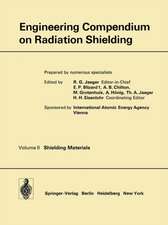The Politics of Nuclear Power: A History of the Shoreham Nuclear Power Plant: Risk, Governance and Society, cartea 5
Autor D.P. McCaffreyen Limba Engleză Hardback – 31 dec 1990
| Toate formatele și edițiile | Preț | Express |
|---|---|---|
| Paperback (1) | 943.73 lei 6-8 săpt. | |
| SPRINGER NETHERLANDS – 27 sep 2012 | 943.73 lei 6-8 săpt. | |
| Hardback (1) | 950.33 lei 6-8 săpt. | |
| SPRINGER NETHERLANDS – 31 dec 1990 | 950.33 lei 6-8 săpt. |
Din seria Risk, Governance and Society
- 15%
 Preț: 644.63 lei
Preț: 644.63 lei - 18%
 Preț: 1228.15 lei
Preț: 1228.15 lei - 18%
 Preț: 958.56 lei
Preț: 958.56 lei - 15%
 Preț: 644.63 lei
Preț: 644.63 lei - 18%
 Preț: 942.01 lei
Preț: 942.01 lei - 18%
 Preț: 955.08 lei
Preț: 955.08 lei - 15%
 Preț: 645.47 lei
Preț: 645.47 lei - 24%
 Preț: 834.72 lei
Preț: 834.72 lei - 15%
 Preț: 631.53 lei
Preț: 631.53 lei - 15%
 Preț: 650.69 lei
Preț: 650.69 lei - 15%
 Preț: 647.92 lei
Preț: 647.92 lei - 18%
 Preț: 953.20 lei
Preț: 953.20 lei - 18%
 Preț: 998.82 lei
Preț: 998.82 lei -
 Preț: 395.63 lei
Preț: 395.63 lei - 18%
 Preț: 1233.52 lei
Preț: 1233.52 lei - 18%
 Preț: 946.10 lei
Preț: 946.10 lei - 18%
 Preț: 950.66 lei
Preț: 950.66 lei -
 Preț: 390.25 lei
Preț: 390.25 lei - 18%
 Preț: 949.55 lei
Preț: 949.55 lei
Preț: 950.33 lei
Preț vechi: 1158.95 lei
-18% Nou
Puncte Express: 1425
Preț estimativ în valută:
181.84€ • 190.54$ • 150.33£
181.84€ • 190.54$ • 150.33£
Carte tipărită la comandă
Livrare economică 11-25 aprilie
Preluare comenzi: 021 569.72.76
Specificații
ISBN-13: 9780792310358
ISBN-10: 0792310357
Pagini: 269
Ilustrații: VIII, 269 p.
Dimensiuni: 155 x 235 x 23 mm
Greutate: 0.59 kg
Ediția:1991
Editura: SPRINGER NETHERLANDS
Colecția Springer
Seria Risk, Governance and Society
Locul publicării:Dordrecht, Netherlands
ISBN-10: 0792310357
Pagini: 269
Ilustrații: VIII, 269 p.
Dimensiuni: 155 x 235 x 23 mm
Greutate: 0.59 kg
Ediția:1991
Editura: SPRINGER NETHERLANDS
Colecția Springer
Seria Risk, Governance and Society
Locul publicării:Dordrecht, Netherlands
Public țintă
ResearchCuprins
1. Introduction.- Technological Factors: Discoveries, Uncertainties, and Limits on Safety Strategies.- Economic Factors: Shifting Electricity Demand and Financing Problems.- Managerial Factors.- Political Attitudes.- Summary and Outline of the Book.- 2. Shoreham’s Beginnings.- The Early Development of Nuclear Power.- The Surge in Orders.- The Decision to Build Shoreham.- Basic Design of the Plant.- Key Early Decisions.- Summary.- Appendix to Chapter 2.- 3. The early Politics of Shoreham.- The Contrasting Reactions to Shoreham and Lloyd Harbor.- The Purpose of AEC/NRC Hearings.- The Licensing Process.- Shoreham’s Hearings.- Two Views of the Hearings.- Appendix to Chapter 3.- 4. Shoreham’s Contruction.- The Review of Construction.- Oversight by LILCO’s Board of Directors and Others.- LILCO’s Management of the Regulatory System.- The Failure of Engineering to Support Construction.- LILCO’s Relationship with Stone and Webster.- Labor Productivity.- The Failure of the Diesel Generators.- Disallowance of Costs.- Appendix to Chapter 4.- 5. The Emergency Planning Controversy.- The Strengthening of Planning Requirements.- The County’s Split with LILCO.- The Marburger Panel.- LILCO’s Tax Maneuver and Cohalan’s Switch.- The Federal Test of Emergency Planning.- The Federal Response to State and Local Opposition.- Appendix to Chapter 5.- 6. Takeover, Settlement, or Shoreham?.- The Establishment of the Long Island Power Authority.- Takeover or Negotiated Settlement?.- Projected Costs of the Settlement and Alternatives.- Appendix to Chapter 6.- 7. The Politics of Settling Shoreham.- The Reactions to the Settlement.- LILCO’s Progress in Licensing Shoreham.- Legislative Action on the Settlement.- The RICO Suit.- The Revised Shoreham Settlement.- The FederalGovernment’s Opposition to the Settlement.- The Economic Evaluation of the Settlement.- The Denouement at Shoreham.- Conclusion.- Appendix to Chapter 7.- 8. Conclusion.- LILCO’S Problems and Changes.- State and Local Opposition.- Policy, Personal Stakes, and Decision Momentum.- References.- Appendix: Chronology of Significant Events in the Shoreham Project.





















